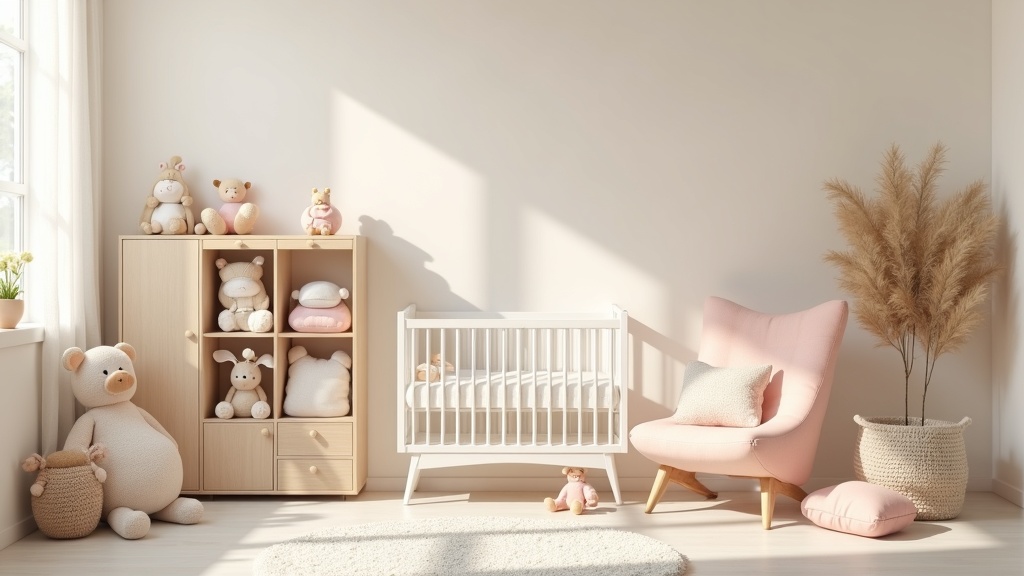Becoming a new parent comes with a blend of excitement, nerves, and plenty of questions. Especially when it comes to your baby’s milestones and development! I remember feeling completely overwhelmed by the amount of information out there, so having a simple, straightforward guide made a big difference for me. Here, I’m sharing what I’ve learned about baby milestones and growth, plus some practical tips that can help make the first year just a bit less mysterious.

Understanding Baby Milestones and What They Mean
Baby milestones are those cool moments you hear parents cheering about, like rolling over, smiling for the first time, or learning to wave. These are key markers of how a baby’s brain and body are developing. While there’s a general timeline for when most babies hit these points, every little one grows at their own pace.
Pediatricians use milestones as checkpoints for physical, social, emotional, and language growth. If a milestone takes a bit longer to show up, it doesn’t automatically mean something’s wrong. However, it helps to stay in touch with your child’s doctor and trust your instincts when something feels off. From my personal experience, if you’re unsure, a quick chat with your pediatrician can set your mind at ease.
Common Baby Milestones by Age
Tracking these milestones can be super useful for celebrating progress and spotting areas where your baby might benefit from extra support or encouragement. Here’s a breakdown I found handy, divided by age range:
- Newborn to 3 Months: Begins to lift head when on tummy, starts to make eye contact, responds to loud sounds, and flashes a first smile around 6-8 weeks. Your baby is getting used to the world and discovering their own body, so lots of gentle encouragement goes a long way during this time.
- 4 to 6 Months: Rolls from tummy to back, grabs at toys, pushes up on arms during tummy time, giggles, and may recognize familiar faces. Hand-eye coordination starts to kick in, and you’ll notice them reaching and swatting at objects more confidently.
- 7 to 9 Months: Sits without support, starts babbling (dada, baba), tries to crawl or scoot, and transfers objects from hand to hand. Stranger anxiety might start to show up now. Babies this age love interactive games such as peekaboo or passing a ball.
- 10 to 12 Months: Pulls to stand, cruises along furniture, waves bye-bye, responds to their own name, and may try to say “mama” or “dada” to the right parent. Some babies might even take their first steps before their first birthday.
Every child’s path looks different. Some skip crawling and go straight to walking, while others chat before they walk. Enjoying each new ability as it arrives keeps stress to a minimum. Remember to celebrate small wins; every little achievement matters.
How to Encourage Healthy Development
Babies pick up new skills through play, everyday interactions, and lots of loving attention. For me, the best advice was to turn daily routines into learning opportunities. Here are a few ideas that worked well in my own home:
- Talk and Sing Often: Even before they can answer, hearing your voice helps babies with language and social skills. Narrating your actions or singing silly songs makes even diaper changes more engaging for your little one.
- Tummy Time: Daily supervised tummy sessions help your baby get ready for rolling, sitting, and crawling by strengthening neck and shoulder muscles. You can make tummy time more interesting by adding colorful toys or mirrors.
- Read Books: Those brightly colored board books might get gummed up, but introducing books early supports early literacy and helps with bonding, too. Try reading at different times of day to create positive associations with books.
- Offer a Safe Place to Move: Encourage crawling, scooting, or walking in a clear, soft area. Babies need room to explore on their own terms. Placing a soft rug or blanket on the floor can invite movement and exploration.
- Follow Baby’s Lead: Some days your baby might seem really into playing and trying new things, and other days they’ll need more breaks and snuggles. Both are completely normal and part of their unique rhythm.
Simple toys, sensory activities, and time outside can all give development a natural boost. There’s no need for fancy gadgets or expensive setups—often, plastic cups or textured scarves do the trick and keep your baby exploring.
Staying Relaxed About Milestone Timelines
It’s easy to get stuck comparing your baby with others. I had days when I wondered why my baby wasn’t crawling “on time,” but most kids catch up in their own way when given the right environment and encouragement.
There’s a wide range of normal when it comes to hitting milestones. Reliable resources, like the CDC Developmental Milestones and regular pediatric check-ins, can offer guidance if you ever feel concerned or just want to double-check your baby’s progress.
What to Watch for and When to Reach Out
It’s super important to trust your gut. While missed milestones don’t always mean there’s a big issue, early support can make a difference. You might want to bring things up with your baby’s doctor if you notice any of the following:
- Stiff or floppy body movements that don’t seem to relax over time.
- Lack of eye contact, social smiles, or response to loud noises by 3 months.
- No babbling or vocal play by 9 months.
- Still unable to sit without help by around 9 months.
- Zero interest in playing with toys or interacting by 12 months.
Doctors and child development professionals are familiar with these worries and can offer reassurance, suggest simple activities, or connect your family with physical, occupational, or speech therapy if needed. If you ever feel uneasy about something your baby is or isn’t doing, check in sooner rather than later; you’re not alone.
Supporting Baby’s Growth With Everyday Routines
Babies love routine, and fitting in development-friendly activities during the day can help both of you thrive. Here’s how I made the most of daily moments:
- Bath Time: Splashing and playing with safe toys in the tub helps with fine motor skills and hand-eye coordination. You can name body parts or use toys to make simple stories.
- Feeding (Breast or Bottle): Cozy feeding sessions offer a time for face-to-face bonding, promoting social and emotional growth. Making silly faces or chatting during feeds kept my baby smiling and engaged.
- Diaper Changes: I used these as a chance for peekaboo, singing, or showing bright, simple toys. Turning routine tasks into playful moments eases transitions and makes your baby look forward to them.
- Walks in the Stroller: Everyday sights, sounds, and textures from the outdoors are full of new experiences. Pointing out birds, feeling leaves, or talking about what you see helps link words with the world around them.
No need to fill your schedule with activities. Just being present and responsive is the foundation for growth. Your baby learns more from you than any organized activity.
Practical Tips for Tracking and Celebrating Milestones
Keeping up with all the new things your baby does can be tricky, especially when sleepless nights are involved. Here’s what worked best for me:
- Keep a Simple Journal: A notepad, calendar, or phone app makes it easy to jot down “firsts” and see patterns over time. You can note things like first laughs, favorite foods, or first steps, creating a timeline you’ll cherish.
- Take Short Videos: Snagging quick clips gives you memories to cherish and can help you share concerns with your pediatrician if needed. It’s also fun to look back at how much your baby has changed in just a few months.
- Snap Photos, But Don’t Stress: Capturing milestones is fun, but don’t feel pressure to have a photo for everything. Some of my best memories are the ones not caught on camera; be present for the moment instead of always reaching for your phone.
Tell your family and friends about those new tricks and find your circle of support to share in your excitement, too. Grandparents, aunts, and uncles love hearing about baby’s latest achievements, and their encouragement means a lot.
The Role of Play in Baby Development
Playtime is one of the easiest and most enjoyable ways to encourage your baby’s progress. I found that following my baby’s interests, whether it was banging on pots and pans or shaking a rattle, led to lots of giggles and discoveries.
- Sensory Play: Tactile toys like soft books, textured balls, or water-safe items help babies explore using their senses. You can add some variety by switching up textures or temperatures—like letting them play with a cool washcloth.
- Musical Play: Shakers, simple xylophones, or just clapping and singing support rhythm, listening, and motor coordination. Dancing slowly together or moving to the beat adds another layer of fun.
- Imitative Play: Games like “patacake” or copying facial expressions are great for social and language skills. Blowing kisses or waving are favorite games that never get old.
No fancy setups required. Your kitchen drawer or a basket of safe household objects works just as well and sparks just as much learning. Everyday play helps skills grow naturally, building a foundation for later learning.
Answers to Common Questions About Baby Development
New parents ask these a lot, and I totally get why!
Question: What if my baby skips a milestone?
Answer: Some babies just do things differently. If your child is overall growing, learning, and happy, it’s usually nothing to worry about. Bring it up at your next checkup if you feel concerned; trust your instincts.
Question: Should I compare my baby to apps or books?
Answer: Milestone charts are helpful for general guidance, but real life rarely lines up perfectly. Treat them as flexible guides, not absolute rules. Your baby’s story is uniquely theirs.
Question: When should I get early intervention?
Answer: If you ever feel unsure, there’s never harm in checking in with your pediatrician or a child development specialist. Extra support early on can give both you and your baby more confidence going forward.
Resources for Tracking Baby Development
If you’re like me and want a little backup, these resources are worth checking out:
- Pathways.org – Science-backed milestone guides and activity ideas
- CDC – Learn the Signs. Act Early. – Free printable milestone checklists by age
- HealthyChildren.org – Practical parenting and development info from the American Academy of Pediatrics
Parenting comes with a lot of surprises, but being familiar with baby milestones helps you spot, celebrate, and support your child’s unique path. Each baby’s story is full of firsts; enjoying the ride and staying flexible is super important for staying confident and relaxed along the way. Remember: every step is worth celebrating, and you’re doing a great job.
